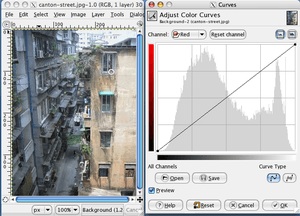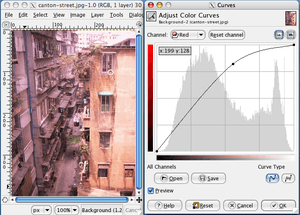Curve (tonality)


In image editing, a curve is a remapping of image tonality, specified as a function from input level to output level, used as a way to emphasize colours or other elements in a picture.[1][2]
Curves can usually be applied to all channels together in an image, or to each channel individually.
Applying a curve to all channels typically changes the brightness in part of the spectrum. The software user may for example make light parts of a picture lighter and dark parts darker to increase contrast.
Applying a curve to individual channels can be used to stress a colour. This is particularly efficient in the Lab colour space due to the separation of luminance and chromaticity,[3] but it can also be used in RGB, CMYK or whatever other colour models the software supports.
See also
- Blend modes
- Hurter–Driffield curve
- Tone reproduction curve
References
- ↑ The gimp manual
- ↑ Adobe web site on curves in Photoshop
- ↑ Margulis, Dan (2005). Photoshop LAB Color: The Canyon Conundrum and Other Adventures in the Most Powerful Colorspace. ISBN 0-321-35678-0.
External links
- Defanging the Curves Vampire, Dan Margulis, December, 1996